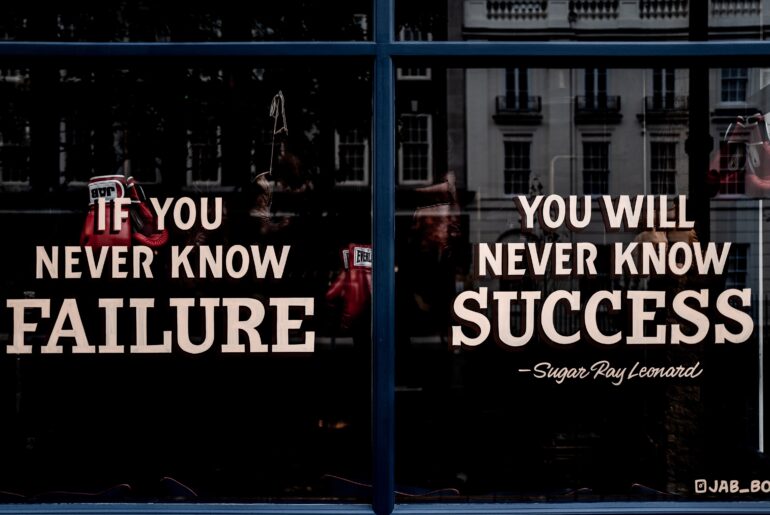Depression is an illness that affects 280 million people in the world. In these two years, the Covid pandemic and social restrictions had a massive impact on our mental health. What can we do to overcome depression?
Even if we feel overwhelmed, there are simple steps we can take to start feeling better with a little help from technology.
Apps to connect with the right people effectively
Feelings of loneliness can make us feel judged or misunderstood, so we isolate ourselves even more to avoid negative emotions.
You don’t have to put a happy mask on and force yourself to interact with anyone. You could find deep connections and support on these platforms:
1. Improspeak: the place to find “your” people
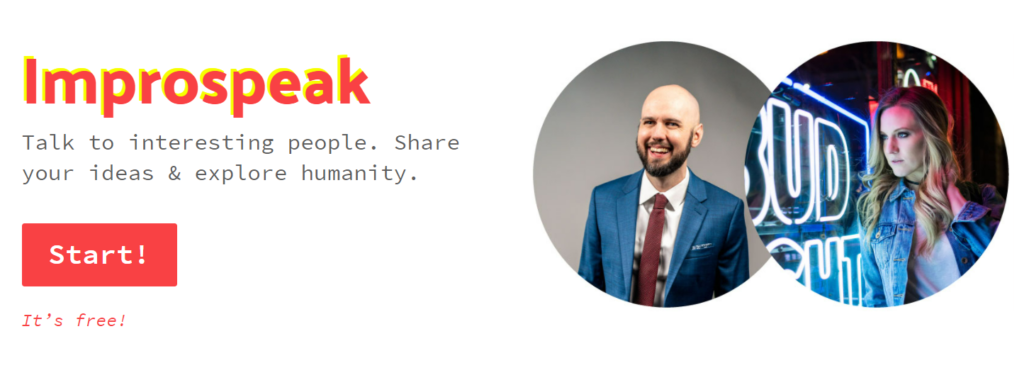
Improspeak is a solid app where you can talk and share your thoughts and feelings in a community of like-minded people.
All you need is a webcam and a microphone, and Improspeak will match you with someone based on your shared interests, then you can start talking.
If you struggle to find topics to talk about, Improspeak gives you question cards that you can use to keep the conversation going or explore different issues.
A unique aspect of Improspeak is its way to keep moderation: after each chat, you will be able to rate your conversation buddy. This system keeps the community a safe space to share your thoughts.
So if you want to overcome depression by having meaningful conversations with open-minded people, Improspeak is the perfect solution for you.
2. Paltalk: be yourself anonymously

Paltalk is an anonymous app that allows you to enter live chatting rooms about various subjects, from animals to mental health.
You can go with the flow and pick a random room with a topic you’re interested in, or you can create a group and host your room about anything you want to discuss.
If you’re camera-shy, Paltalk provides a wide range of filters and video effects to help you share your feelings and experiences anonymously.
3. TalkLife for anxiety, depression & stress
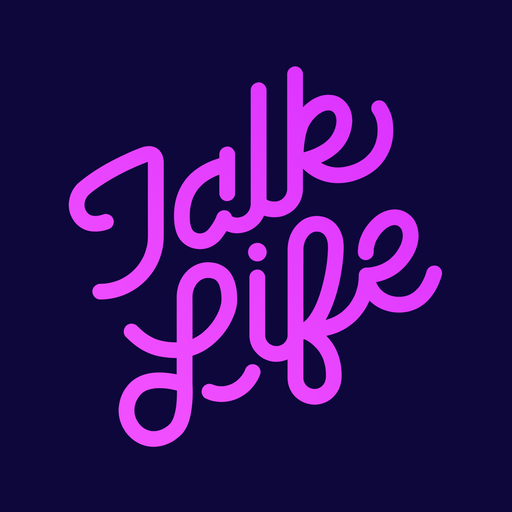
Talk Life works as a place to share your thoughts and find supporting people online. Talk with people who suffered from depression and get their advice.
You’re not the only one who’s been there. For every problem, there’s a place online. You can search for a specific topic, and you’ll be surprised by the number of people willing to help you out or talk about similar situations.
4. HearMe: empathy not therapy

HearMe is a safe space to talk about your struggles with professional listeners who understand what you’re going through.
In a few minutes, you will be connected to a Listener in confidential chats, where you can fully express yourself and feel understood.
The app also gives you podcasts and resources to listen to and exercise by yourself.
Apps to take control of your thoughts and change them

You may think that suppressing your emotions and avoiding these feelings is the logical way to cope, but this could be unhealthy.
Allow yourself to feel what you feel, don’t judge and accept these thoughts as they come and go. If you suppress your feelings, they will get bigger and find a way to come out, so just let them flow through your mind and body.
Monitoring your mood could make you notice how specific thoughts repeat themselves and if they’re correlated with specific triggering situations. Here are some apps to help you:
1. MindDoc: a great way to monitor your mood
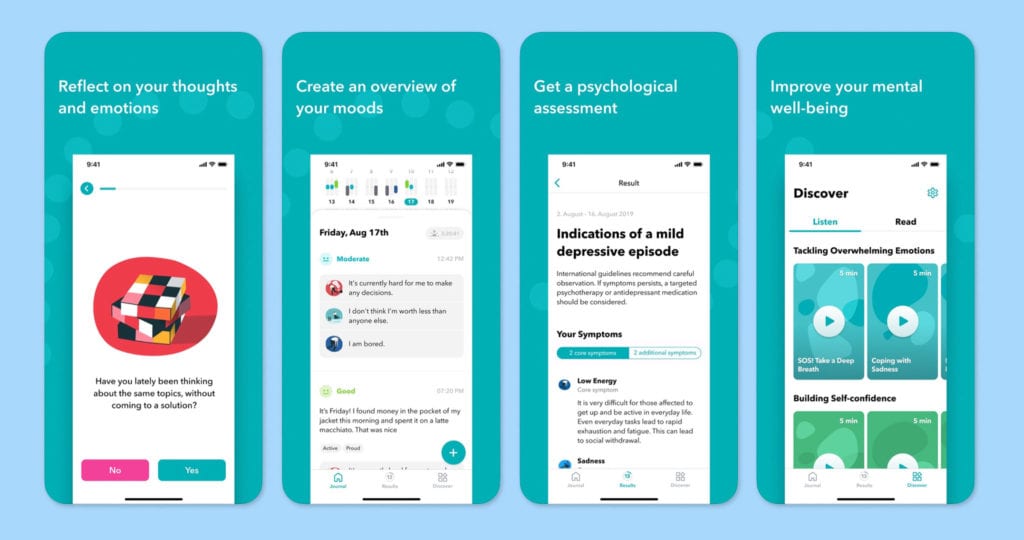
MindDoc is an app developed by clinical psychologists to help you monitor your mood during the day. This app offers personalised insights, exercises and courses about anxiety, depression, insomnia and eating disorders based on your symptoms.
MindDoc also gives you a monthly report on your mental health state. You can share it with a professional therapist so you can have a full prospect on your health.
2. WorryTree: anxiety relief and CBT diary
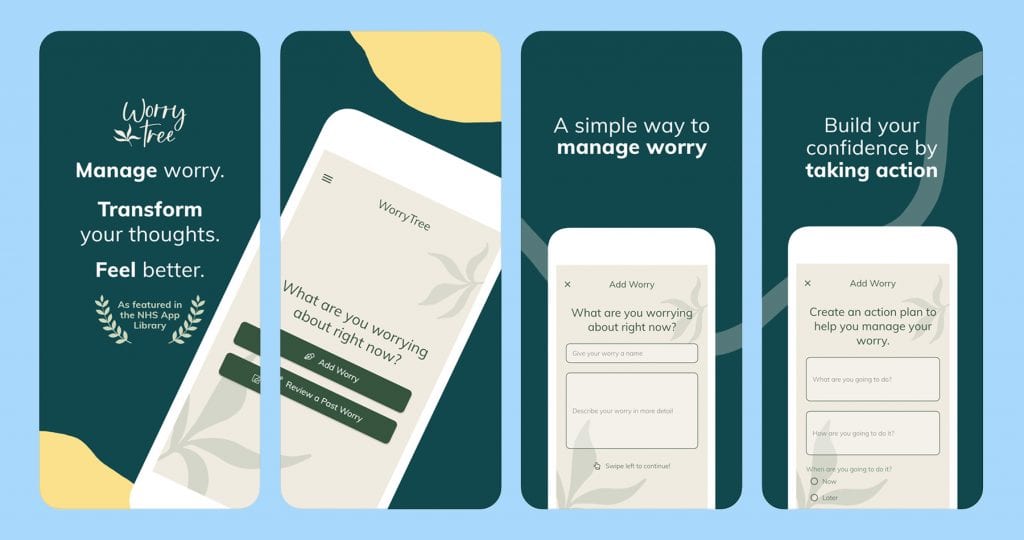
Worry Tree is an app that uses Cognitive Behavioral Therapy (CBT) techniques to help you manage your anxiety and stress levels. You can become more aware of your thoughts and worries through diaries, and with simple exercises. This app lets you practice gratitude and positive thinking by building long-term strategies to manage your anxiety step by step.
3. Sanvello: everything you need
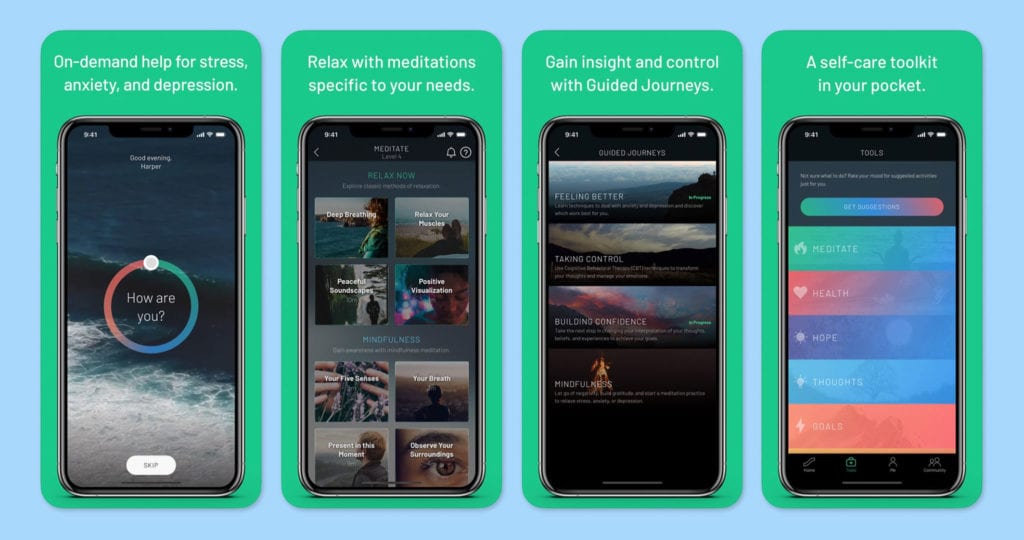
Sanvello is a complete app designed by mental health professionals, that addresses a wide range of issues, from depression to burnout. It helps you face them with customised tools, including therapy, coaching, mood and goal tracking, video meditations and CBT exercises.
You can start with a few questions on your mood to establish what are the necessary steps, then, the app can give you the perfect tool for your needs.
Sanvello also provides a community to share your journey and encourage each other. If you need professional help, the app can also match you with the right therapist.
Apps to build a self-care habit

Think about what you need physically and mentally, and start doing little things for yourself every day. If you’re feeling numb, think about things that used to make you feel joy and start by doing little steps.
Remember that there is no pressure to complete tasks or to be productive. Just do what makes you feel calm.
Self-care doesn’t necessarily mean spending money on massages or expensive treats. It simply means nurturing yourself by doing what gives you pleasure. Find out how to get better with these apps:
1. InnerHour: self-care therapy
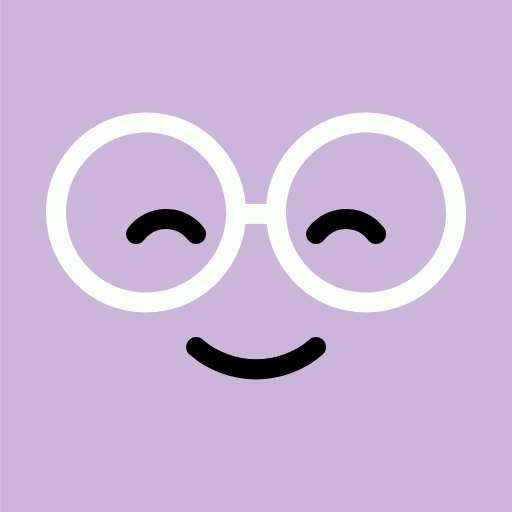
Inner Hour is designed to cover different mental health areas: depression, anxiety, sleep, stress, anger and happiness training. Through a personalised assessment, you can build your own journey. You will have self-care activities, goal tracking, mood tracking and professional resources about mental health.
Inner hour also offers a chatbot named Allie that can help you instantly by identifying the right tool to relax.
2. Intellect: Create A Better You
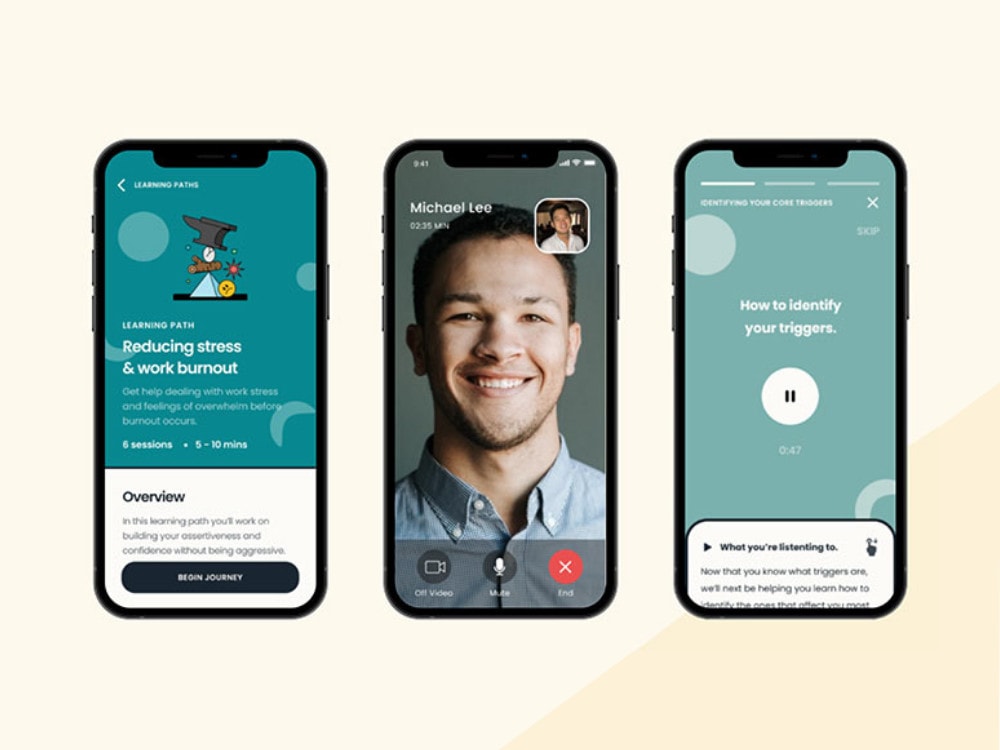
Intellect is a self-training app developed by CBT psychologists that lets you work on your traits, thoughts and behaviour.
This app helps you overcome struggles like procrastination and low self-esteem to become more assertive and confident. Start working on yourself with the right tools!
Apps to monitor your sleep and learn to relax

Diseases like depression have a significant impact on our physiological state. If we’re depressed, we can quickly notice changes in our sleep, food, and libido habits.
People suffering from depression tend to sleep too little or oversleep, so it’s essential to keep a healthy sleeping routine to get back on track. Here are some helpful apps to do that:
1. Sleep Cycle: the perfect alarm clock

Sleep Cycle is an app that works as a smart alarm clock. It tracks your sleep flow and wakes you up when you’re in your light sleep time so that you feel restored and full of energy.
This app analyses your sleep, including your movements and sounds to give you a complete report on your sleep quality, while offering guides and meditations.
2. Balance: meditation & sleep
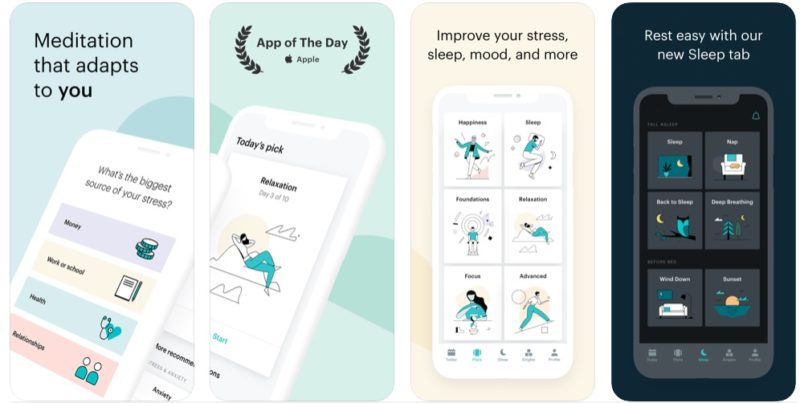
Balance offers a wide library of meditation tailored to your goals and answers. On this app, you can learn to be in control of your emotions and thoughts at any moment.
You can work on a ten-day plan to master your meditation skills, while Balance gives you relaxing sounds and exercises to do before bedtime so that you get the better sleep possible and feel restored for the day.
3. Headspace: a wide library for your needs
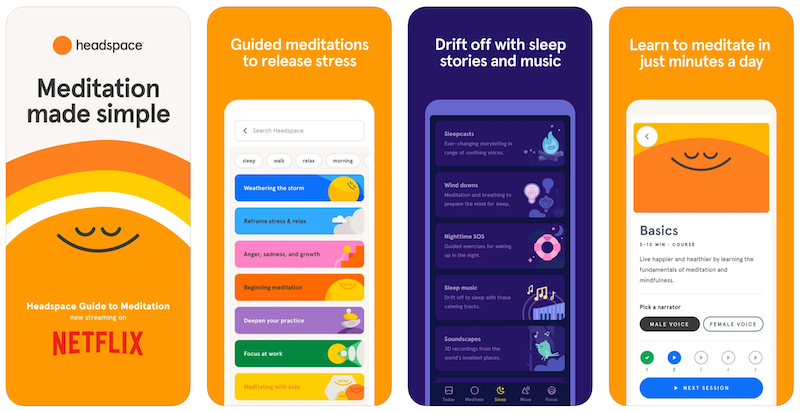
Headspace teaches you the fundamentals of meditation and mindfulness with guided exercises. It addresses areas like stress management, sleep habits, procrastination, physical health and more.
To help you with your sleep quality, Headspace offers a library of relaxing meditations, bedtime stories, natural sounds and calming activities. Fully relax with the option you prefer!
Apps to keep a balanced relationship with food
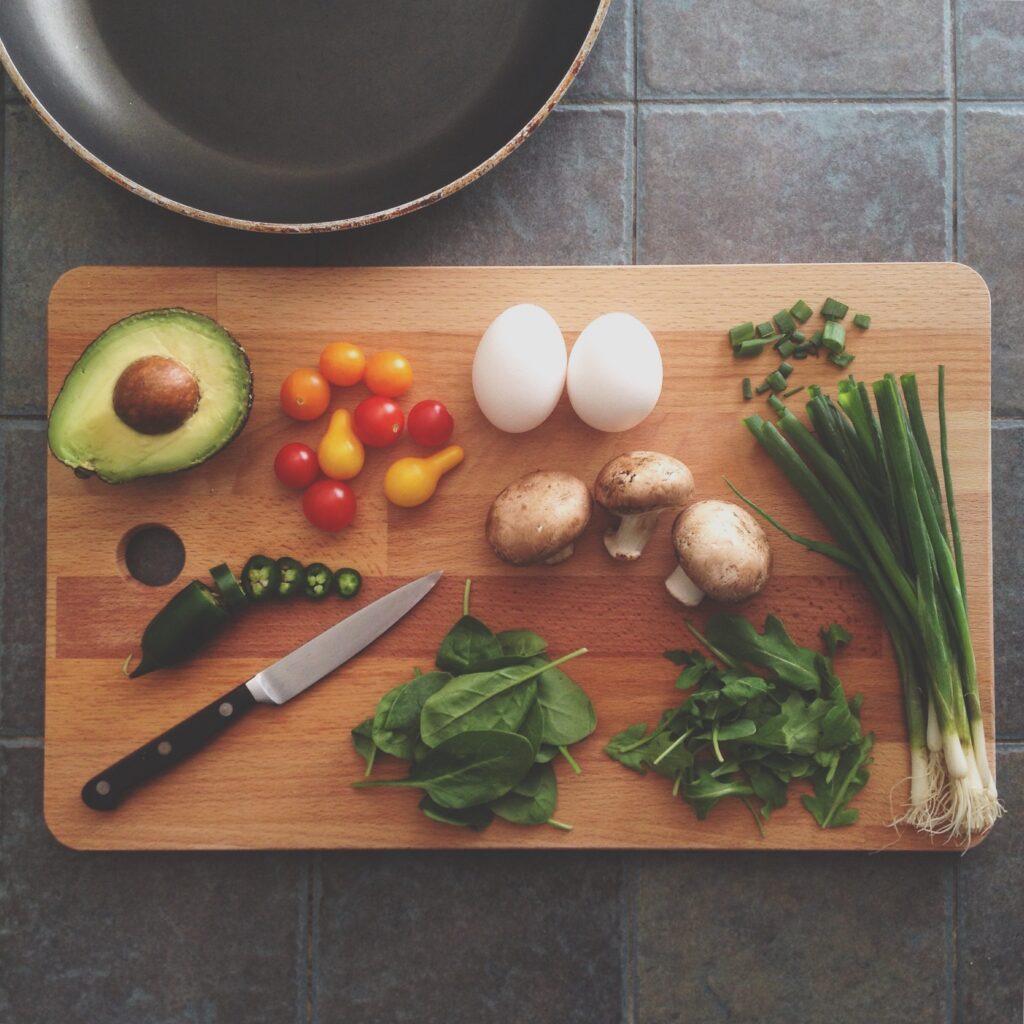
As we said, eating habits could be affected by depression.
You could lose appetite or overeat, and you can use some tips to keep a normal relationship with food.
There is no judgment as long as you keep your body alive; you’re in survival mode when you’re depressed.
If you catch yourself losing appetite and you’re too tired to eat, you can take preventive action by buying food that’s super easy to prepare or ready to eat.
Some foods make depression worse, like fast food and sugary ones, so try to consume depression-friendly foods such as fish, white meat, veggies and nuts.
Try to be mindful when you eat, check out these apps:
1. Mealime – Meal Planner, Recipes & Grocery List
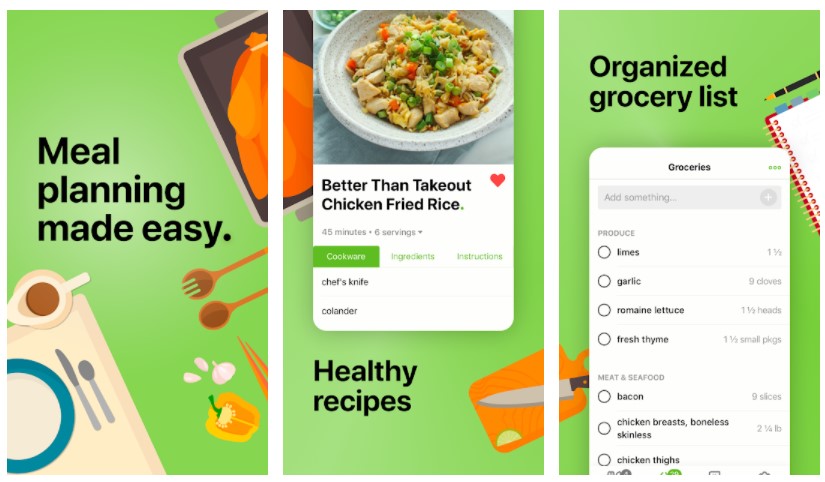
Mealime provides easy and personalised meal plans and grocery lists to help you eat mindfully and feel better. This app lets you choose what to eat by giving you healthy recipes, a simple meal planner, easy grocery lists and nutritional pieces of information about every product. Feel relaxed and confident in your relationship with food!
2. Plan to Eat: Meal Planner
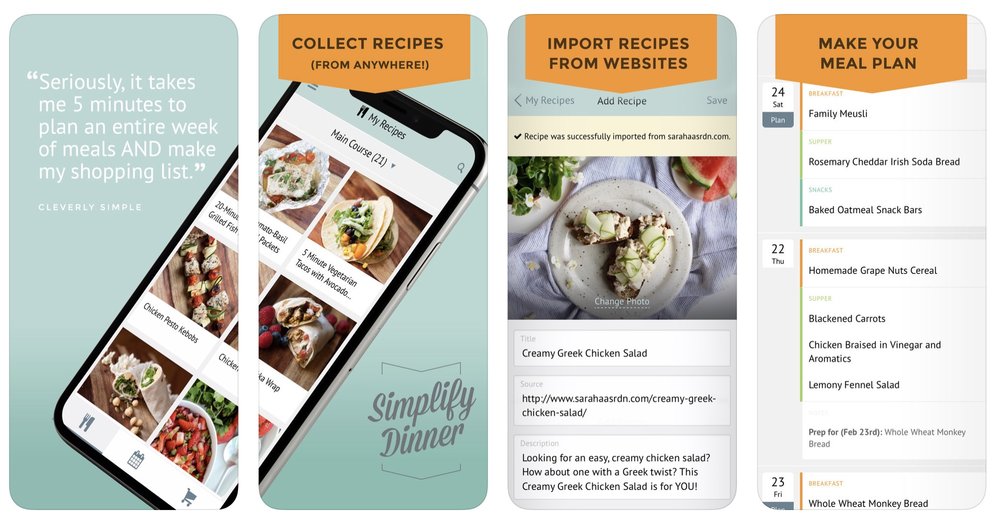
Plan to Eat synchronises your grocery list with your recipes and gives you a complete view of your ingredient stock, so you always know what you miss in your home and what you need to buy when you’re in the grocery store. You can create your custom plan, share your recipes with friends and learn to cook your favourite recipes with a step by step guide.
Apps to help you with tasks and motivation
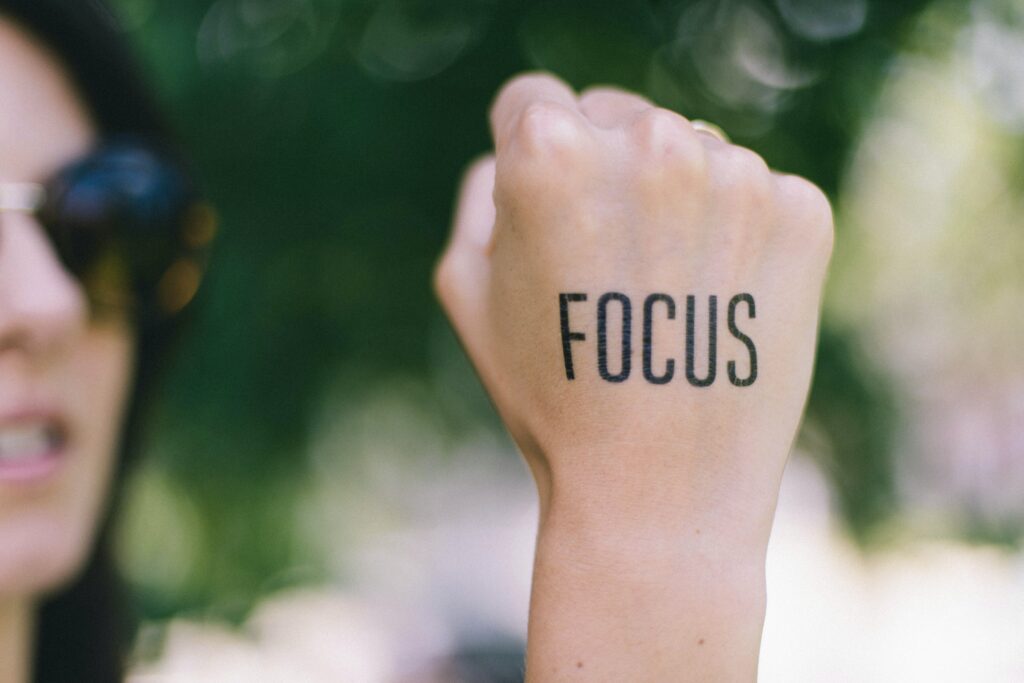
With depression, daily tasks seem heavier, and we find it challenging to keep ourselves clean as well as our space.
Having a shower can become a nightmare in our mind because it requires too many steps for our brain and body, and we get anxious and tired.
Remember, you’re not lazy; you’re depressed. Don’t gaslight yourself!
A helpful tip is to break up the task into tiny steps and start by doing the first one. Decompose daily tasks in little steps and remember that one little step is better than nothing. Check out these apps to keep a healthy routine:
1. Fabulous: daily routine planner
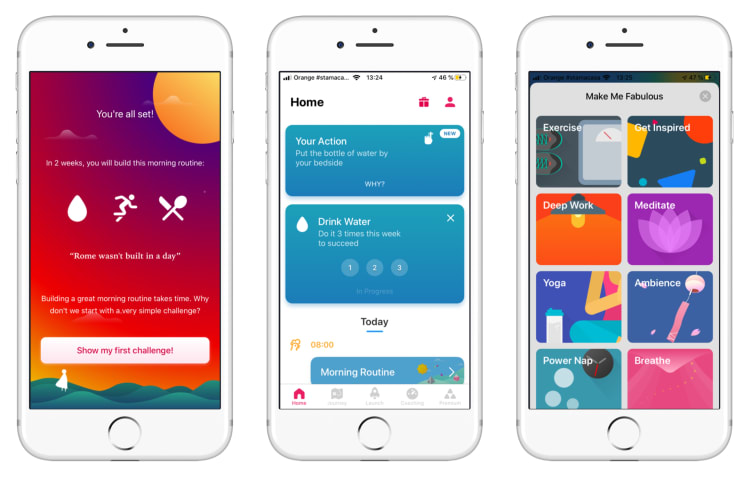
Fabulous is a life coach that gives you the right motivation to develop habits for your mental and physical health. Set your goals and preferences in your routine, and this app is going to help you with specific steps to reach your full potential.
You can also use Fabulous if you have trouble sleeping, keeping a healthy relationship with food, being active or even just in your daily activities if you struggle with keeping a routine.
2. Rabit: grow a garden of good habits

With its cute design, Rabit helps you stay motivated and set new goals and healthy habits with a little gamification reward system: every habit is a little plant you keep alive by going on every day with your work, whenever you skip a step you will little plant will die. Keep your habits garden alive with consistency!
3. 21 Days Challenge: start life changing habits from day 1

Experts say it only takes 21 days to form a new habit.
21 Days Challenge lets you choose which area of your life you want to change by introducing a new habit and it challenges you to keep it alive until it becomes a natural part of your routine. You can find the motivation to keep on working in a supportive community with a personal diary and daily inspirational quotes.
Apps to keep you more active than your thoughts

Physical activity benefits not only your body but also your mind. There is a significant correlation between our mood and moderate exercise, especially with mental health issues such as anxiety and depression.
The activation of your body and the exercise-induced blood circulation increase has an essential correlation with motivation, mood and memory.
There are many exercises you can do from your home or outside, from yoga to high-intensity workouts; you just have to start. Remember: one single step is better than nothing. Use these apps to have a fitness coach for you:
1. BetterMe: mental and physical health coach
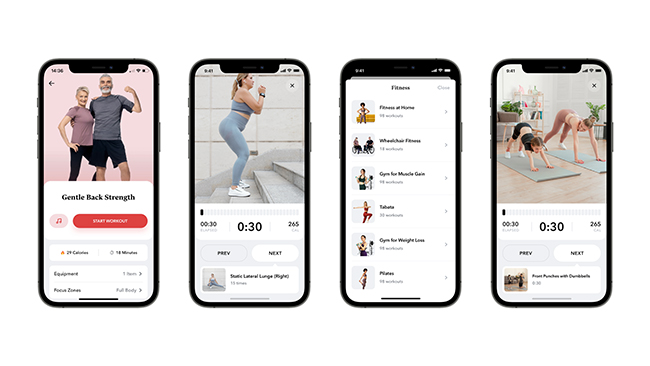
Better Me helps you work on your health in a 360 degrees way. The plan to reach physical goals is based on psychology assessments to offer you completely healthy workouts and nutritional plans with a variety of workouts and classes you can choose from without going to the gym. Better Me truly follows the Latin say “mens sana in corpore sano”.
2. Mindbody: home workout & fitness app
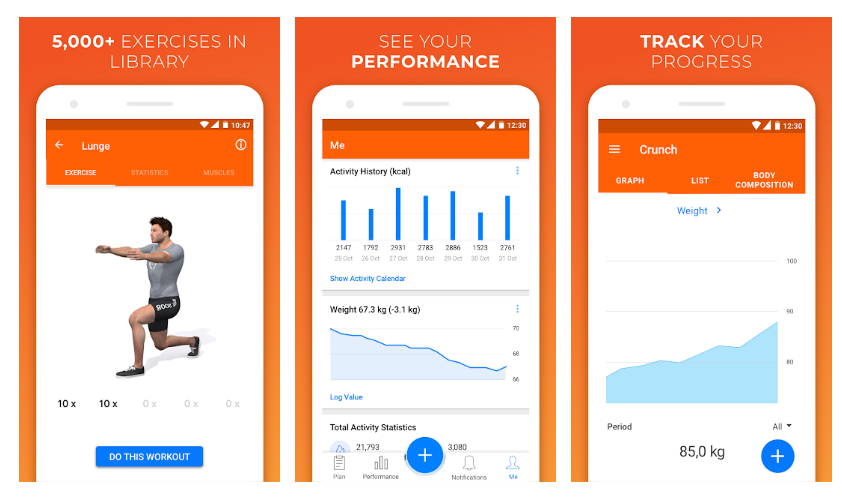
Mindbody helps you reach your fitness goals by finding local classes, wellness services, and fitness workouts wherever you are. You can look for physical classes and services around you with location, date and preferences or you can have home workouts completely based on your needs. You can track your progress and connect this app to your Fitbit to have a complete report on your health.
Apps to use when things are bigger than you

If these symptoms persist for an extended amount of time and you are struggling alone, you should consider discussing them with a therapist.
We don’t need it to be harmful to ask for help, and we deserve to get help as much as other people because we all struggle sometimes, and nobody has to keep feeling like this.
During the pandemic, we’ve seen the development of several online therapy services because of social distancing, so if you don’t want to move from home, you can still start a therapy session online. Choose what is best for your needs and start getting better!
1. Youper Therapy: free support from professionals
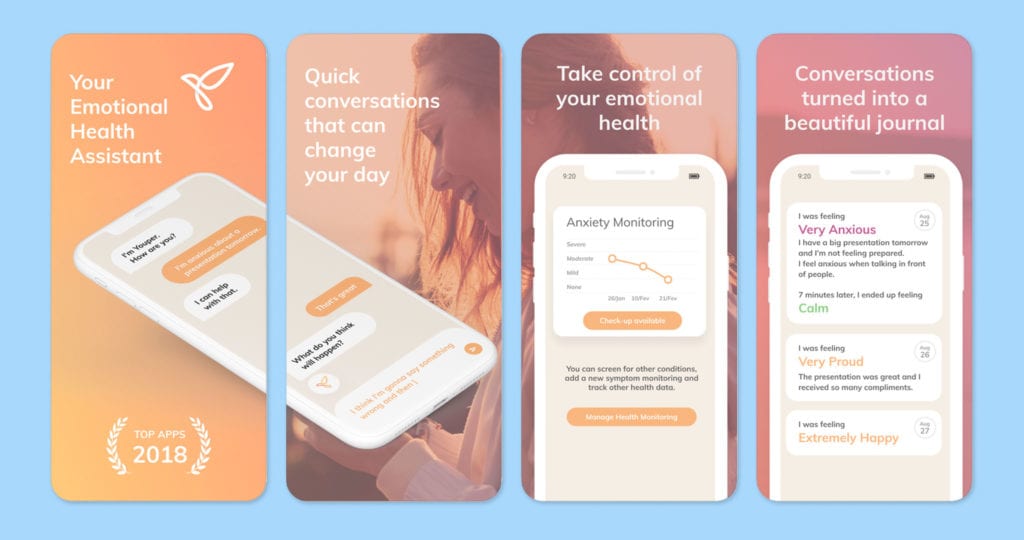
Youper is an app that provides mental health support when you can’t afford therapy or if you don’t have medical insurance. After an initial assessment to understand what you’re going through you will find a range of professional therapists to assist you when you need them, through 24/7 chats and video sessions.
This app is designed to follow a CBT method and help you monitor your symptoms to help you overcome depression and anxiety without worrying about money.
2. Better Help: match with the right therapist
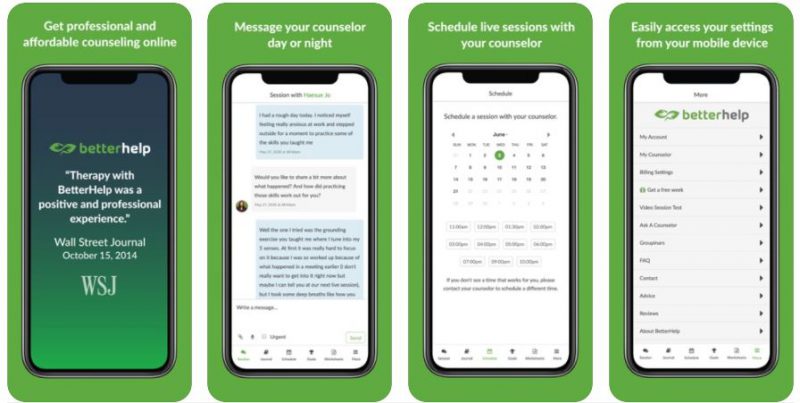
Better Help offers support for your mental health by matching you with the right person. After you answer questions about your needs and preferences, the app will give you the best therapist to start your journey with and feel better. Once you have the right therapist for you, you can have a private room to talk with them and start your sessions on the platform in a calm, safe space.
3. Wysa: your friendly therapy chatbot
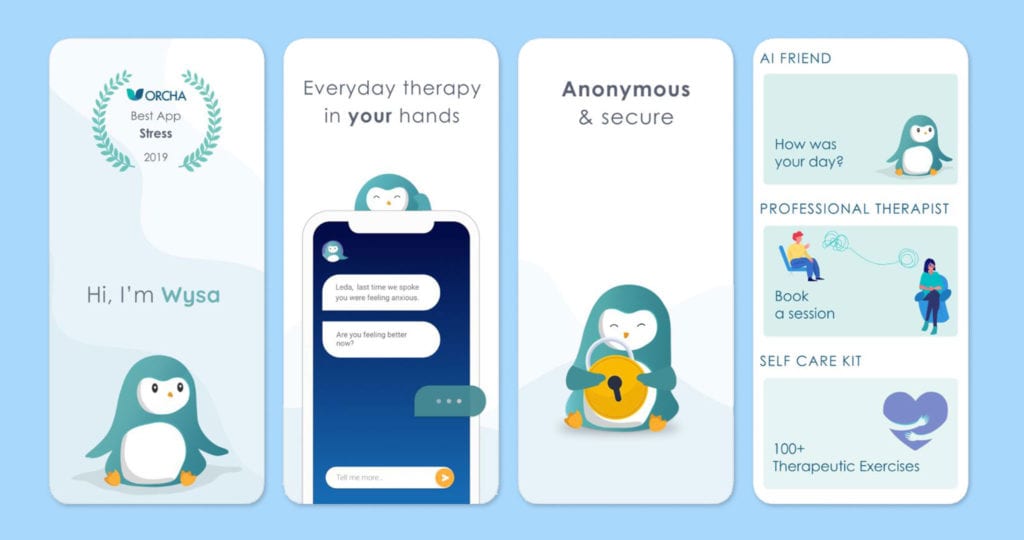
If you don’t want to be assisted by a person, Wysa is a friendly chatbot that helps you navigate your thoughts and feelings with support and motivation. This little penguin offers you techniques, exercises and mindfulness audios to manage your anxiety and motivation every time you need it.
In conclusion
These are the best apps to overcome depression, be patient with yourself and remember that what you’re feeling is absolutely normal! Whether you’re feeling depressed because of a specific situation in your life or without an apparent reason, you can start feeling better with these simple apps.
Don’t be afraid to ask for help if you need it and take care of yourself!


